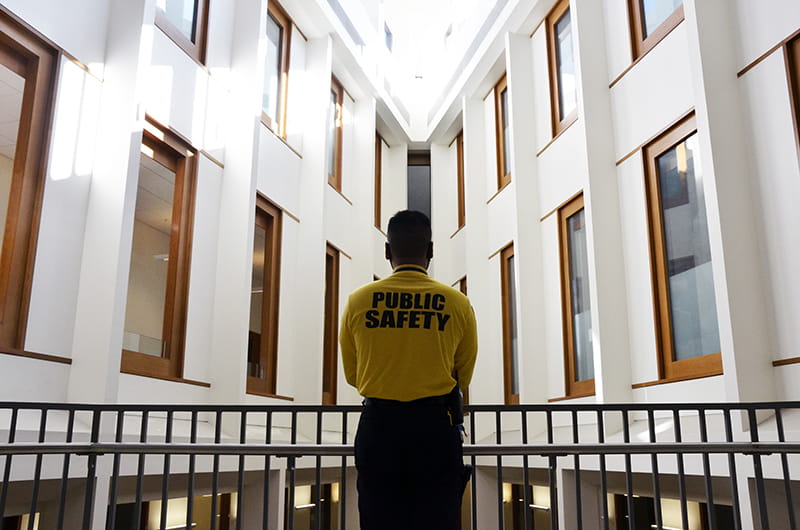Meet Drexel’s New ‘Health Ambassadors’

Please visit the ‘Drexel’s Response to Coronavirus’ website for the latest public health advisories.
For Raymond Sarem, information is key to his success on the job.
He starts his security shift at 6:15 a.m. on Mondays, Wednesdays and Thursdays at his typical post inside Gerri C. LeBow Hall on Drexel University’s University City campus. He refers to notes he’s taken in a small pad tucked into his pocket that outline each of the nooks and crannies of the 11-story building, particularly the four floors where classes take place.
As part of his morning loop through the business college’s maze of classrooms, offices, lounges, hallways and exposed staircases, Sarem checks the monitors outside each classroom that indicate when classes begin and let out. Sometimes, the information on the monitors wasn’t up to date, but Sarem will map out his day by planning to be present 15 minutes before each indicated class starts, as well as 15 minutes after it ends.
This is Sarem’s first professional foray in a security job, which provides the 19-year-old from Northeast Philadelphia with professional experience and a flexible schedule for when he plans to begin his own higher education coursework.
Drexel’s “Return Oversight Committee” launched the health ambassador program at the start of winter term, when more than 1,000 undergraduate students moved back onto campus. The ambassadors’ role is to remind everyone to uphold the Dragon Pledge and practice mutually safe behavior during the pandemic.
Ten such health ambassadors are stationed on campus at any given time, monitoring health and safety compliance in high-traffic areas and classroom buildings between 6:30 a.m. and 10:30 p.m., Monday through Friday.
In his role, Sarem strives to be approachable, without letting health and safety compliance slide, and he takes pride in helping to reduce the spread of the coronavirus.
“It’s our job to make sure everybody in the building is safe, with their mask on,” said Sarem. “If I see something, I’m going to do something about it. I would feel responsible if someone got hurt or sick while I’m on post.”
If Sarem has to say something, or correct someone, he’s calm and polite. He makes a point to walk over to the individuals or groups to speak discreetly, often using hand gestures to ensure his message is heard through his own mask and distance.
“You have to be relatable; you have to be understanding,” Sarem said. “We’re not trying to be the bad guys. We’re here to make sure everybody is safe.”
Marla Gold, MD, vice provost for community health care innovation and director of Drexel’s Return Oversight Committee, calls the health ambassadors a “gentle authority to help redirect what’s going on.”
“When there’s a person not wearing a mask or not wearing it correctly or standing closer than you feel they should…you have a choice,” Gold explained. “You can do nothing, or you can do what most of us do, which is that you look around for who is in charge, and you want [them] to take responsibility and help you mediate what’s going on.”
The ambassadors were hired to work at Drexel through Allied Universal Security Services. Gold helped train the ambassadors before they started in January. She advised them on how to safeguard their own health and safety, and she instructed them on Drexel’s protocols regarding mask wearing, social distancing and use of the Health Checker app, as well as what they should do in specific situations.
The program has smoothed the safe return of students, faculty and staff to the University City campus. Throughout winter term, the University’s positivity rate has averaged well below 2% with a low of 0.5% — much lower than in the city of Philadelphia throughout the winter term overall.
Dozens of Dragons have shared positive feedback about the program, and complaints about noncompliance have decreased dramatically, said Vice President of Drexel Solutions Institute Anna Koulas, who is on the University’s Return Oversight Committee.
“Our goal is to focus on educating students and to help them make good decisions, rather than being punitive,” said Senior Vice President for Student Success Subir Sahu, PhD, of the health ambassadors program. “So far, we think that students have responded well to this approach.”
Sarem enjoys his role as a source of information for students. Whether related to COVID-19 protocols or navigating the building he’s become so familiar with, he tries to exemplify the friendly face and the helping hand needed to help guide the campus community through to better days.
Gold reinforced that the health ambassadors program was not created to police or interrupt campus happenings, but rather ensure everyone’s collective health and safety as well as Drexel’s ability to remain operational at its current capacity.
“Drexel is a community where people come to feel safe,” Gold said. “We have a responsibility to augment that as much as we can. Nothing’s perfect in this pandemic. COVID has certainly taught us that again and again and again, but [this program has] been a big boost. … It makes people feel that they’re cared for, and they are.”
In This Article
Drexel News is produced by
University Marketing and Communications.
